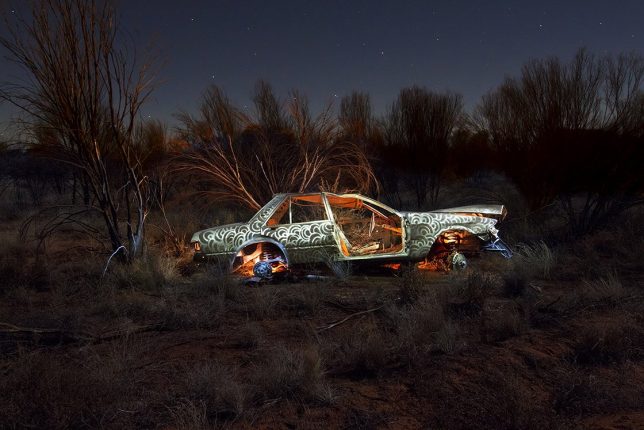A Hole Burned Through the Middle of Everything
By Nicole Treska - Jul 3, 2019

We stalled again, and then we died. It was hot inside, and even though the windows were down, the wind wasn’t blowing our way. I strained to find first and engage the clutch. I let it pop up and pressed the gas, but too fast; the engine caught for a moment, in bright hope, then choked and we were going nowhere—beached and blue in the middle of the intersection, under a sky just as blue, but moving. Ruby sat shotgun, foot out the window, resting on the side-view. Pigeons swooped overhead in lazy ovals—silver when they circled near, black dots when they winged away; then near again, then away, then gone.
“It’s about listening,” Ruby said. She tapped at her ear and pushed the mirror around with her big toe, so it searched the street behind us in sharp, short close-ups. She was teaching me to drive stick because she was blind and drunk and couldn’t.
“Just listen. The engine will tell you. You’ll figure it out. You’ll have to.”
We were both tired from drinking late into the night before. Drunk, the thought of Ruby teaching me to drive was a plan as good as any. The finer points wore wineskates and looped elaborate figure eights through our future, which we admired, gliding toward blackout.
Now—in the morning, in the truck, in the traffic—now we were in deep.
“I think it might be about more than listening,” I yelled across the long bench. The engine stalled again and again and my hangover burned across the back of my skull. My right arm was sore from turning the key, which had imprinted itself on my thumb. With my left arm I did big windmills out the window, imploring people to go around, just go around. But the light changed from green to yellow to red, and no one moved. It was quiet in the intersection until the crosswalk started its heavy click. Ruby turned fast toward the sound. Her smile spread out from the center and faded at the edges.
“See? See?” She held one wavering finger up, like her point held the answer I needed, like I could start the car with what she was about to say. “Just listen! See? I told you. Didn’t I tell you? You don’t even need to see.”
She whistled a short burst of notes and looked in my direction, squinting one eye to hold me whole. “Do you know what song that is?”
She was still drunk; she was drunk anew. I heard her whistling, but I couldn’t answer. Her eyes were a riot. And the cars spilling over the hill behind us? The gazes in the rearview were a riot, too. And the wind through the silver leaves of the birch trees? A riot. And my heart. My heart beating in my chest was a riot.
I wanted horns, or sirens, or a sharp impact to rip me up and fling me elsewhere, anywhere elsewhere. Weeds the emerald color of fancier plants sprung up hip-high on the sidewalks. Next to me, Ruby’s gaze had gone somewhere private.
In the night we drank red wine until the rain put us inside and “incurable” and “accelerated” became abstractions in the fuzzy-dark of the little house. We drank until we laughed about it.
“You fell down the stairs, and I’m the blind one?”
Or, “God grant me the serenity to accept the things I cannot see.”
Or, “What doesn’t kill you makes you blinder.”
Before I passed out, bloody kneed and upright, I promised I’d drive her truck home.
In the morning, the wind had picked up. I watched the clouds skitter and poured my third coffee. Ruby switched to a real drink—filled a mason jar with ice, gin, grapefruit juice, a tall stick of rosemary. “Muscle memory,” she said, wiping the counter with a paper towel.
“Looks like today’s the big day,” she said. “Learn something new, or die trying.” She stirred her herb stick, smiled into her drink. Then she came and sat right up next to me, spilling her gin over her lap, and stage-whispered, “I don’t really know what today looks like.” Her chuckle was hoarse from cigarettes and booze, and her free hand mimed violent explosions. “There’s a hole burned through the middle of everything.”
The retina records what you see and sends the image to your brain. When the macula—a tiny oval in the retina—deteriorates, you lose acuity from the inside out. You lose the fine detail. Then all the detail. Then you lose everything.
I turned the key and stamped the pedals in the right order, by miraculous accident. It wasn’t elegant, but I’ll tell you this: sometimes there is no quick enough escape from where you are.
I found second, straight south. Ruby smiled into the new breeze of our movement and said, “You pick shit up pretty quick when you have to. Maybe things aren’t so bad, after all.” She closed her eyes, turned her face side to side to feel it all over. She brought the jar of clear stuff from her purse to her lips in a smooth motion, then used her arm to wipe her mouth, shoulder straight down to elbow. “Shift!” She shouted.
She was listening for the whine, for that sustained vvvvvvv of impatience that signaled something overdue. When she heard it, high and urgent, she said, “Ok, good. Up to third, and easy. I need this truck, now more than ever.”
I shifted to third, but I couldn’t tell between roar and rev. Strange thing to say, now more than ever. But what did I know about what she needed? And how do you help someone lose everything?
***
Ruby used to sell diamonds on cruise ships. Used to hold the tiny specks of fire and move her hand to catch the light until the rocks exploded with brilliance. She was an expert at catching the shine—a top salesgirl. The trick, she said, was not to let on that you were playing with people’s perception. She could spot a mark the second they stepped in, see the want all over their faces.
After that, we waited tables, and Ruby caught the shine there, too. Night after night she made big eyes at the big money guys and coaxed them to order from the bottom of the list—down where the triple-digit wines were, and the big commissions. We drank their leftovers and made good money. We fucked the line cooks and the club members, after work, in the sand, against the sea wall. We were so young.
During split-shifts, we’d swim. The water was deep and clear, and eels and reef sharks hunted below. We never wore our jewelry in the water. Sharks don’t eat humans, but in the blur of the ocean, flashes of silver and gold can trick the eye. Even a shark’s eye, evolved to see through blur.
“They have a blind spot on their snout,” Ruby would say, as we started through the channel, her stroke sure and constant. “So, if you’re lucky enough to see it coming, go for the snout.”
She never wore goggles. She said she’d rather not see it coming.
***
Once the truck got going, the engine moved under its own turning and I rested my hand loose on the knob. The trees that lined the road sang with bird noise and foliage. Ruby was looking out the car window. She could see the sky, but not the clouds thinning into atmosphere.
“I haven’t stopped drinking since I saw the doctor,” she said. I didn’t ask how long. “Everything is unreal. Faces started disappearing on me, like a nightmare. One day I see you, the next day you’re gone. And you know what’s wild? I don’t even miss them that much—the faces. People are easier out of focus.”
The road rolled on uninterrupted, and the wind rushed through the cab, puffing our shirts out against our seatbelts in that summer way. Our hair flailed and whipped and the tires lapped a lopsided rhythm. We passed a sign announcing the onramp, and I read it out loud. For a while everything was fine—we talked about the past, because the past was easier to map than the future.
“Can you see my face?” I asked, taking my eyes off the road to look at her. It seemed important that she see me.
“Watch the road. One of us should.”
She opened her phone and read a text from her ex, from whom we’d taken Big Baby Blue. She held the screen to her nose to see the words.
“He can’t believe I took it. He thinks he gets to keep my anything? If I can’t keep anything, neither can he. You hear that? He gets nothing of me. Shift into fourth, now, Jesus, can’t you hear?”
The clutch was heavy, and I held it down hard with my toes. I leaned forward on the big bench seat and jammed the gearshift down to the right, snug into fourth. The gears were so loose the shift nearly kissed the floorboards on its way down. The truck idled a beat, then caught, then went faster. The sun made sharp lines across soft lawns as it moved toward the top of the sky. Ruby let her fingers swim through the airstream out the window, and said she should have known.
“I saw it with my own eyes,” she said.
We passed block after block of houses with swing sets and open screen doors, and all of it was so golden and nice in the morning, it burst my heart to look.
